Featured News - Current News - Archived News - News Categories
Story and photos by Alice Gerard
Grand Island High School student Megan Pinzel said that being part of Jeff Green’s environmental science class has had a big effect on her way of thinking about the natural environment.
“I am a lot more conscious of how to be a steward of the environment,” Megan said. “The environment is a relevant problem in our world that has to be addressed. It (the class) has steered my career path in a different way. I am considering an environmental major.”
Megan was one of a group of Grand Island students who participated in the Inaugural Environmental Ambassador Summit, held Feb. 9 at the Linde Technology Center in Tonawanda, and organized by the Niagara River Greenway Commission. The summit featured students from eight local high schools: Big Picture (Kenmore), Grand Island, Kenmore West, McKinley, Nichols, North Tonawanda, Riverside and St. Joseph’s Collegiate Institute.
The summit was one of a number of projects that were funded by the Tonawanda Community Engagement Benefit fund. The fund was part of a settlement with the former Tonawanda Coke in 2015 that mandated Tonawanda Coke pay $2.75 million in civil penalties, spend approximately $7.9 million to reduce air pollution and enhance air and water quality, and spend an additional $1.3 million for environmental projects in the area of Tonawanda. It was an all-day event that included presentations from Buffalo Niagara Waterkeeper, Canisius College, Casella Waste Systems, Daemen University, Department of Environmental Conservation/Reinstein Woods, Dupont, Linde, Niagara University, NOCO, New York Sea Grant, New York State Parks, Sumitomo Rubber, University at Buffalo, U.S. Fish and Wildlife Service, and WNY Land Conservancy. In addition, Erie County Forester Josh Konovitz gave a keynote speech about environmental careers, and Helen Toledo, president and founder of Buffalo Women of Environmental Learning and Leadership (BWELL), gave a keynote speech about environmental equity and creating solutions to environmental problems that include all people.
“We were awarded almost a quarter of a million dollars from the Tonawanda Community Engagement Benefit Fund,” said Michelle Lockett of the Niagara River Greenway Commission. “They are competing for first place here, where they get additional funding. All of them get funding (of $1,000) to do their projects.”
To participate in the summit, the students first had to write proposals and submit a mini grant application, Lockett explained: “We actually put together a mini grant application for the kids. There’s criteria to follow and points assigned to each one, and the judges actually reviewed all of those proposals.”
In addition to the original application, the students had to produce posters to be displayed at the summit, and give an oral presentation to a panel of judges. The students had eight minutes to present their projects.
The winning school, which was awarded additional funding to complete its project, was Riverside High School.
Lockett said, “Under the direction of teacher Jerry Krajna, students (Salman Awil, Rajen Biswa, Hay Blu, Jaiquan Martinez, Wangiya Mpiana and Andre Williams) will be improving the plant biodiversity, increasing neighborhood nature knowledge using four different languages, and beautifying their campus with their Senior Legacy Project.
“Second place went to North Tonawanda High School, who will involve the entire community in reducing plastic pollution in various areas in North Tonawanda. They will motivate people with prizes through a gaming application they plan to develop. Nichols School took third place with their project of sprucing up a rest area on the Jesse Kregal bike path that runs along the Scajaquada Creek. Their project includes trash collection, native plantings and educational messages about freshwater ecosystems.”
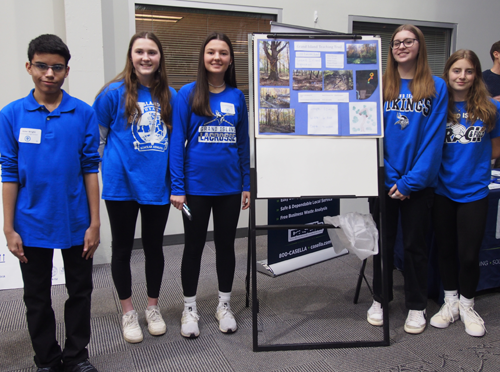
Grand Island students with their poster explaining the proposed teaching trail. Students in the picture include Keira Murray, Asher Wright, Hailey Green, Megan Pinzel and Savannah Samplinski.
••••••••
Grand Island’s proposed project is a teaching trail that would be located on school grounds and would be accessible to students, teachers and classes.
Student Savannah Samplinski, who was part of the team, said she was interested in “ways to help the environment, to reduce waste and to find more sustainable ways of living.”
Asher Wright, another member of the team, said he is “learning a lot of new things about the environment and talking about different plants. I like trails and being outside.”
The hope, Lockett said, is to produce the next generation of people who are involved and active in conserving the environment.
“They all probably have an interest in the environment,” Lockett said. “They’re coming with their environmental studies classes or they have an environmental club, a garden club. Somehow, it’s some club or science class that has something to do with the environment. I’m hoping that it will go to the next level. These kids might actually make a career out of it. If they don’t want to make a career out of it, at least they have a better appreciation to become good stewards. Throughout their life, they’ll volunteer doing conservation activities, even if it’s cleanups.”
Green said the summit is great – “It has students planning projects for the future, and they get to decide about their future, about colleges and professions.”
Lisa Chimera, a retired teacher who is now deputy county executive, said, “Anytime we can provide students with hands-on opportunities is so valuable. Today, we brought together environmental organizations, businesses and our students to have valuable conversations about the environment.”
Dave Spiering from New York State Parks shared information with the students about restoration projects being done on Grand Island. He mentioned work that has been done for five years on habitat restoration in Burnt Ship Creek with the goal of restoring connections that were lost.
“The creek was overrun with cattails,” he said. “It prevented access for fish to spawn in the wetlands. This created more open water and more open spaces for birds, such as the great blue heron.”
He added that the restoration makes it easier for the birds to find frogs or fish to feed on.
Lockett said that she is hoping to present this program again next year.
“We need to find the funding for it because the grant money is going to run out,” she said. “We have enough money to do another one, but the money is supposed to be running out on Feb. 1 of 2024, which would be not enough time for the kids to do their projects the following year. So, we’re working on trying to get an extension on that. Not more money, just a time extension.”
The summit was hosted by Linde Inc., an industrial gas supplier in Tonawanda.
“They offered the space for free and gave lunch for free. And I think it’s so cool to bring the kids here,” Lockett said. “This is a huge global company.”
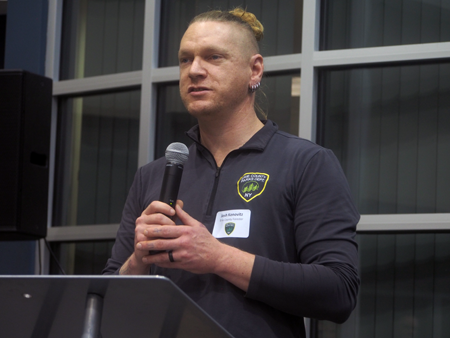
Erie County Forester Josh Konovitz talks to students about possible careers in the environmental field.
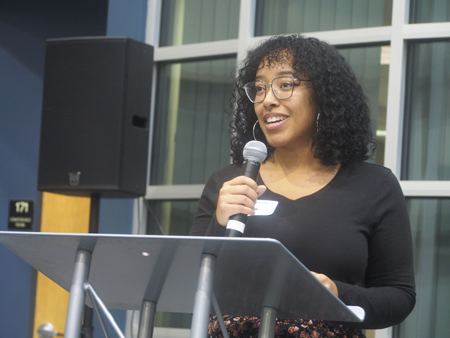
Helen Toledo, president and founder of Buffalo Women of Environmental Learning and Leadership (BWELL), talked about environmental equity and creating solutions to environmental problems that include all people.
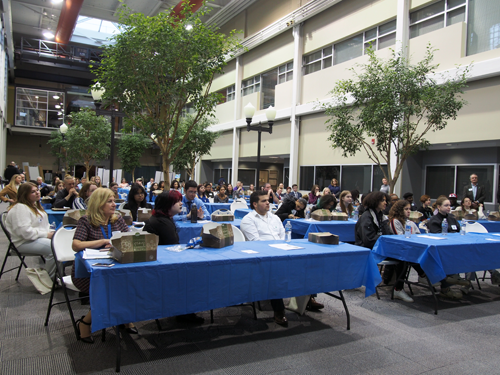
Students and teachers listen to the keynote speeches by Erie County Forester Josh Konovitz and Helen Todaro of Buffalo Women of Environmental Learning and Leadership.
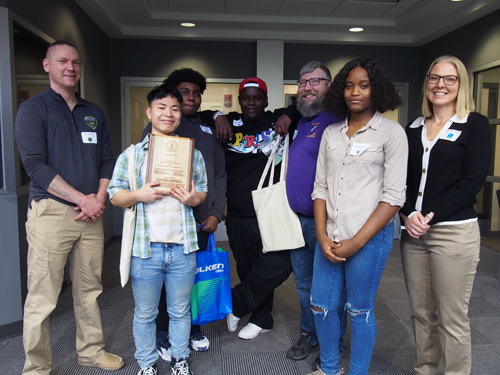
The winning team from Riverside High School, with Michelle Lockett of the Niagara River Greenway Commission.





























